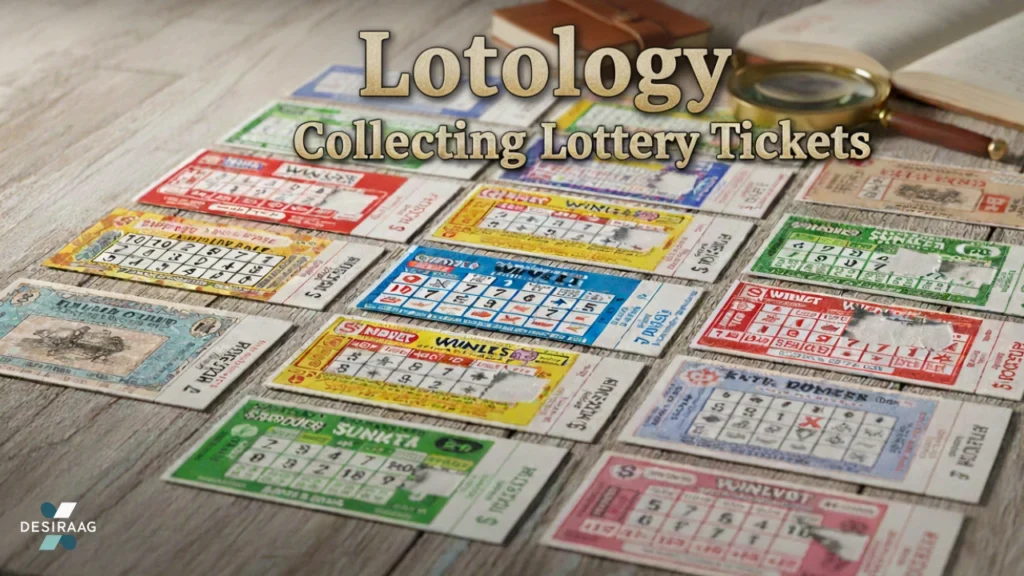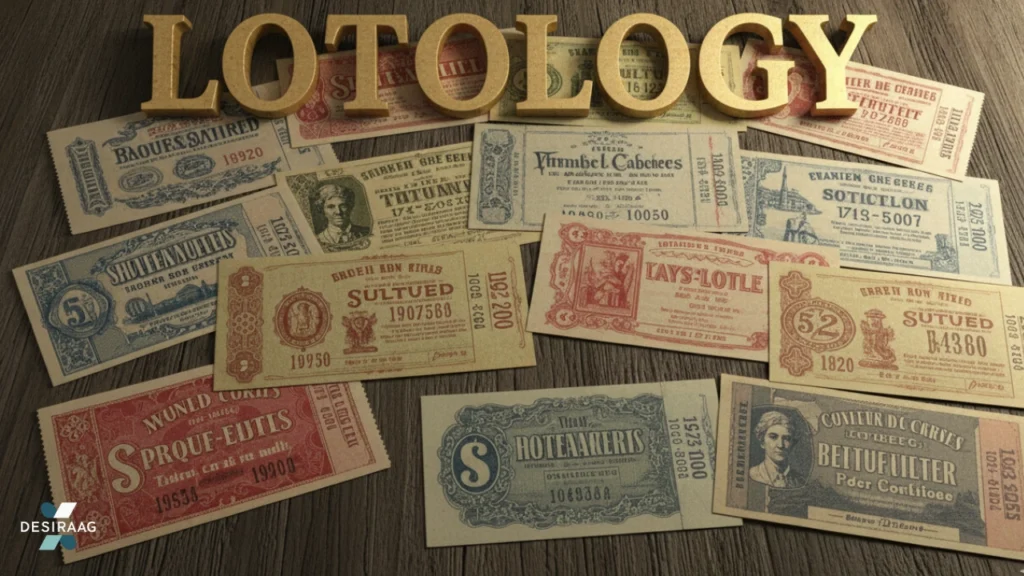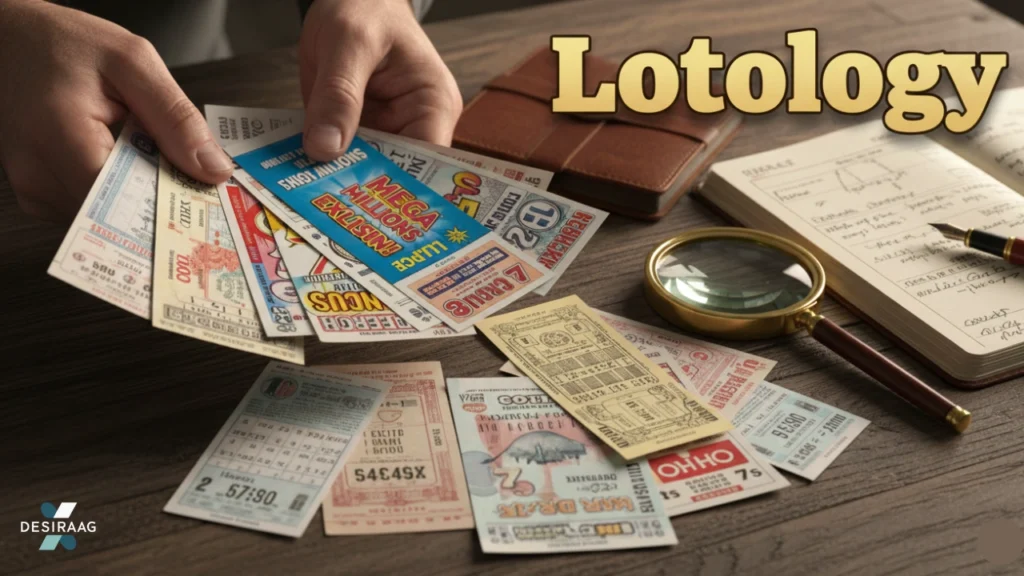Among the many hobbies people pursue, some are conventional, like stamp collecting, coin collecting, or comic books, while others are more unusual yet equally captivating. One such unique pursuit is lotology. While most see lotteries simply as games of chance or opportunities to win money, lotologists—enthusiasts of lotology—approach lottery tickets from an entirely different angle. They collect, study, and preserve these tickets for their artistic designs, historical significance, rarity, and cultural value.
What Is Lotology?

Lotology is the study and collection of lottery tickets. While lotteries have been around for centuries as a means of raising funds or offering entertainment, lotology focuses on the tickets themselves rather than the games’ monetary aspect. Lotologists collect tickets for several reasons:
- Design Appreciation – Many tickets feature intricate artwork and themes, making them collectible as miniature pieces of art.
- Historical Significance – Some tickets offer a glimpse into the past, reflecting the era’s culture, economy, or political environment.
- Cultural Value – Lottery tickets often showcase national or regional symbols, events, or holidays, making them culturally interesting artifacts.
- Psychological Fascination – The concept of chance, anticipation, and hope embedded in lottery tickets adds an exciting psychological dimension to collecting.
In essence, lotology turns everyday lottery tickets into objects of fascination and study, transforming a simple game of chance into a hobby with depth, purpose, and community.
The History of Lotology
The practice of collecting lottery tickets may not be widely known, but it has been around for several decades. Lotology grew as lotteries themselves became more sophisticated, moving from simple paper tickets with handwritten numbers to printed, colorful scratch-off tickets and digital vouchers.
Also Read
In the early 20th century, lotteries were often organized by local municipalities, charities, and governments as a way to raise funds. Tickets from these lotteries were usually simple, featuring plain designs with serial numbers and basic information. However, as lotteries became more commercialized, ticket designs became more elaborate, featuring illustrations, vibrant colors, and themes celebrating national events, holidays, or cultural icons.
Collectors soon realized that these tickets were more than just pieces of paper—they were reflections of their time, capturing societal trends and aesthetic preferences. This realization led to the birth of lotology as a recognized hobby.
Why People Collect Lottery Tickets
Lotology may seem unusual at first glance, but the reasons behind the hobby are as varied as the tickets themselves. Here are some of the primary motivations:
1. Artistic Appreciation
Lottery tickets are often miniature canvases that feature high-quality artwork. From colorful scratch-off designs to intricately printed commemorative editions, tickets appeal to collectors as pieces of visual art. Some special editions may even feature famous artists or local cultural motifs, further enhancing their value to collectors.
2. Historical Insight

Old tickets often provide a unique perspective on the past. They can showcase societal values, national events, or even political changes. For instance, lottery tickets issued during significant historical periods—such as post-war reconstruction or landmark anniversaries—can become valuable collectibles.
3. The Thrill of Rarity
Much like coins or stamps, some lottery tickets are rare due to limited production or misprints. Collectors actively seek these tickets, and the hunt for rare or unique pieces adds a thrilling element to lotology.
4. Nostalgia
Many collectors are drawn to tickets from their own childhood or earlier decades, evoking memories and emotions associated with simpler times. This nostalgia factor adds a deeply personal dimension to the hobby.
5. Social Connection
Lotology has a thriving community worldwide. Collectors exchange tickets, share stories, and participate in conventions or online forums. Being part of a community that appreciates the same niche hobby can be immensely rewarding.
Types of Lottery Tickets Collected
Lotology encompasses various types of tickets. Some collectors focus on one category, while others aim for a diverse collection. Common types include:
1. Scratch-Off Tickets
Scratch-offs are a favorite among collectors because of their vibrant designs, interactive nature, and limited editions. Special themed scratch-offs, such as those celebrating holidays, movies, or sports, are particularly sought after.
2. Traditional Draw Tickets
These tickets are associated with number draws and often have historical significance. Early 20th-century tickets, charity lottery tickets, or local government-issued draw tickets are examples.
3. Commemorative Tickets
Some lotteries issue tickets to celebrate important events, anniversaries, or cultural icons. These tickets often have elaborate designs and may be produced in limited quantities, increasing their collectible value.
4. Misprints and Errors
Just like in stamp or coin collecting, misprinted tickets or those with unusual errors are rare and highly prized by lotologists. These tickets often carry a higher value due to their uniqueness.
The Psychology Behind Lotology
The allure of lotology isn’t just about aesthetics or history—it’s also deeply psychological. Lottery tickets embody chance, risk, and reward, appealing to the human love for anticipation. Collectors often enjoy:
- The thrill of discovery: Finding a rare or unique ticket provides excitement similar to unearthing a hidden treasure.
- Hope and imagination: Each ticket tells a story or sparks the imagination, even if the collector never plays the lottery itself.
- Completion and organization: Like other forms of collecting, lotology satisfies the desire to categorize, preserve, and complete a collection.
This psychological dimension sets lotology apart from casual hobbies, giving it depth and meaning for those passionate about it.
Getting Started in Lotology
If you’re intrigued by lotology and want to start your own collection, here’s a practical guide:
Step 1: Research and Learn
Begin by understanding the types of tickets available, their history, and their collectible value. Books, online forums, and websites dedicated to lottery ticket collecting are excellent resources.
Step 2: Decide Your Focus
Some collectors specialize in scratch-off tickets, while others focus on historical draw tickets. Determine what appeals most to you and start building your collection around that theme.
Step 3: Acquire Tickets
Tickets can be acquired through various sources:
- Purchase new tickets for their design or theme.
- Seek out old tickets from antique stores, flea markets, or auctions.
- Exchange tickets with other collectors through online forums or communities.
Step 4: Preserve Your Collection
Proper preservation is essential. Store tickets in protective sleeves, albums, or frames to prevent damage. Avoid exposure to sunlight, moisture, or rough handling to maintain their condition and value.
Step 5: Connect with the Community
Join online groups, attend conventions, or participate in lotology forums. Connecting with other collectors can help you learn, trade, and enjoy the hobby more fully.
Lotology Communities and Events
Although niche, lotology has a global following. Enthusiasts often gather online and in person to share their passion:
- Online Forums: Websites and social media groups provide platforms for collectors to showcase their collections, ask questions, and trade tickets.
- Conventions and Shows: Some countries host collectible fairs or lottery conventions where lotologists can meet, display tickets, and participate in trading events.
- Exhibitions: Certain museums or galleries occasionally feature exhibitions on lotteries, tickets, and gambling history, offering insight and inspiration for collectors.
Being part of these communities not only enhances your knowledge but also adds a social aspect to the hobby.
The Value of Lottery Tickets
While most people see lottery tickets as disposable, lotologists recognize their potential value. Several factors determine a ticket’s worth:
- Age: Older tickets often become more collectible, especially if they are rare.
- Rarity: Limited editions, misprints, or special themed tickets carry higher value.
- Condition: Well-preserved tickets are more valuable than damaged or worn ones.
- Historical Significance: Tickets associated with major events or notable issuers are often sought after.
It’s important to note that not all tickets will increase in monetary value, but their historical and aesthetic value can be priceless to collectors.
Challenges in Lotology
Like any hobby, lotology comes with challenges:
- Storage: Accumulating tickets over time requires careful storage and organization.
- Authentication: Ensuring that tickets are genuine and not reproductions or fakes can be tricky, especially for rare or antique pieces.
- Market Fluctuations: The collectible market can be unpredictable, and the value of certain tickets may vary over time.
Despite these challenges, many collectors find the joy and knowledge gained from lotology to far outweigh the difficulties.
Why Lotology Is More Than a Hobby
Lotology is not just about collecting tickets—it’s about connecting with history, culture, and art. Each ticket represents a snapshot of the time and place in which it was issued. Collectors often feel a sense of satisfaction from preserving these tiny historical documents for future generations.
Moreover, lotology encourages curiosity, research, and attention to detail. Collectors develop skills in cataloging, preservation, and historical research, making it an intellectually stimulating hobby.
Conclusion
Lotology is a unique and fascinating hobby that transforms ordinary lottery tickets into collectibles with historical, artistic, and cultural value. From vintage draw tickets to modern scratch-offs, each piece tells a story and offers insight into the era it represents. Whether driven by nostalgia, art appreciation, or the thrill of discovery, lotologists find joy in collecting, preserving, and studying these miniature works of chance.




